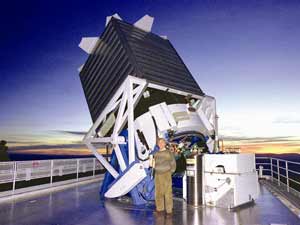The biggest questions of early 21st century science
On the first anniversary of the 125th anniversary, the famous Science magazine published a list of 125 greatest scientific problems. The structure of the universe and matter, the nature of consciousness, are two of the top concerns of humankind.

Astronomical Observatory - 'god eyes' and 'hearing ears' constantly receive signals from the universe
On this occasion, Doctor of Mathematics - Ly, Professor of National University named M. Lomonosov, Academician of Russian Academy of Sciences (HLKH) Leonid Lescov has an interview with News.
Sir, the structure of matter and the universe is a mystery that attracts human interest since time immemorial. So, what do we know today about this mystery?
There have been treatises proving that the universe formed 13-15 billion years ago from nothingness. At the time of formation, the universe was extremely small, about 10-33cm in size. So far no one has given the answer exactly how the universe formed and before the formation of the universe, what exists in nature.
How do academics think about travel machines in time?
There are many interesting studies on travel machines over time based on a completely scientific basis. Academician Russian Institute Anatoli Logunov once demonstrated that the speed of light is not the absolute limit as in Albert Einstein's Theory of Relativity. For example, it can travel over time at speeds greater than the speed of light.
According to academics, how does matter and awareness relate to each other?
Ancient philosophers argue that the universe is unified and that everything born in it can be explained by the general rules. Later there is division, whereby the real world we can observe is divided into two parts:
1- The insensitive material world follows the rules of geometry and is studied by physical science.
2- The world of perception is not materially studied in theology of theology. Since then scientists continue to study the nature of perception, but have not found the basis to confirm the material world and the cognitive world share a common nature.

Universe formed from Big Bang (Big Bang)
We often assume that perception is a function of the brain made up of atoms and molecules. But there is another point of view. For example, a neuroscience scientist and a Nobel Prize-winning scientist insisted that perception could not be regarded as a type of known structure.
From here, there are many theories, including the most fictional hypotheses, but there is no clear scientific theory of awareness.
Is there a civilization other than our Earth?
It is difficult to think that we are alone in the universe. In our Galaxy there are 1,011 stars. And in the universe, there are also many galaxies. Thus, the number of stars in the universe is much more infinite. Humans have only discovered more than 150 planets.
All of those planets are very big. But if there are many large planets, why can't there be Earth-sized planets? Very likely there are planets and possibly civilization on it. Thus, there may be other civilizations in the Universe. Are we ready to communicate with those civilizations?
On this topic there were many scientific and philosophical documents. The kind of life we will have to contact is not necessarily the same as our conception of intellectual civilization. There is no guarantee that extraterrestrial civilizations will express the idea of friendship and we are able to understand them.
- Solve the 9 biggest mysteries of science in the 21st century
- Predicting the future 50 years later
- Alien prediction will appear right in the 21st century
- 'Attractive' predictions about the 21st century
- The 21st century super modern spy planes
- 21st century: Century of Nanotechnology
- Simple questions still make science
- The first time the signal of the oldest stars in the universe was detected
- Future version of British subway
- Photos of the 21st century flying cars
- Geniuses of the 21st century (last part)
- Geniuses of the 21st century (part 1)
 Vietnam 5th Asian champion on fuel-efficient vehicles
Vietnam 5th Asian champion on fuel-efficient vehicles We can read all NASA studies completely free of charge
We can read all NASA studies completely free of charge Singer and songwriter Bob Dylan won the 2016 Nobel Prize for Literature
Singer and songwriter Bob Dylan won the 2016 Nobel Prize for Literature Scientific revolution in Asia
Scientific revolution in Asia